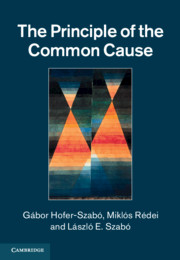Book contents
- Frontmatter
- Contents
- Preface
- 1 Introduction and overview
- 2 The Common Cause Principle
- 3 Common cause extendability of probability spaces
- 4 Causally closed probability theories
- 5 Common common causes
- 6 Common cause extendability of nonclassical probability spaces
- 7 Reichenbachian common cause systems
- 8 Causal closedness of quantum field theory
- 9 Reichenbach's Common Cause Principle and EPR correlations
- 10 Where do we stand?
- Appendix
- References
- Index
10 - Where do we stand?
Published online by Cambridge University Press: 05 June 2013
- Frontmatter
- Contents
- Preface
- 1 Introduction and overview
- 2 The Common Cause Principle
- 3 Common cause extendability of probability spaces
- 4 Causally closed probability theories
- 5 Common common causes
- 6 Common cause extendability of nonclassical probability spaces
- 7 Reichenbachian common cause systems
- 8 Causal closedness of quantum field theory
- 9 Reichenbach's Common Cause Principle and EPR correlations
- 10 Where do we stand?
- Appendix
- References
- Index
Summary
The history of philosophy teaches us that metaphysical claims of sweeping generality are neither verifiable nor conclusively falsifiable. One can only aim at assessing their plausibility on the basis of the best available evidence provided by the sciences – both formal and empirical sciences. This is what has been done in this book in connection with the Principle of the Common Cause.
In Chapter 2, Reichenbach's notion of common cause and the related Common Cause Principle was formulated explicitly in terms of classical, Kolmogorovian probability measure spaces. The Definition 2.4 of common cause followed Reichenbach's original definition closely, and insisting on the quite obvious methodological principle that probabilistic concepts and statements (in particular claims about random events being correlated or probabilistically independent) are only meaningful within the context of a fixed probability measure space in terms of which some segment of reality is modeled, we specified the notions of common cause incomplete and common cause complete probability theories: a theory was defined to be common cause complete if it contains a proper common cause of every correlation it predicts, common cause incomplete otherwise. (There is a strong version of common cause completeness as well: a probability space was defined to be strongly common cause closed if it contains common causes of all admissible types – Definition 4.4.)
These explicitly defined notions form the basis on which one can start assessing the status of the Common Cause Principle in the spirit of empirical philosophy. Suppose we have an empirically confirmed scientific theory T describing some segment of reality using (possibly among other mathematical structures) a probability measure space (X, S, p).
- Type
- Chapter
- Information
- The Principle of the Common Cause , pp. 173 - 179Publisher: Cambridge University PressPrint publication year: 2013



